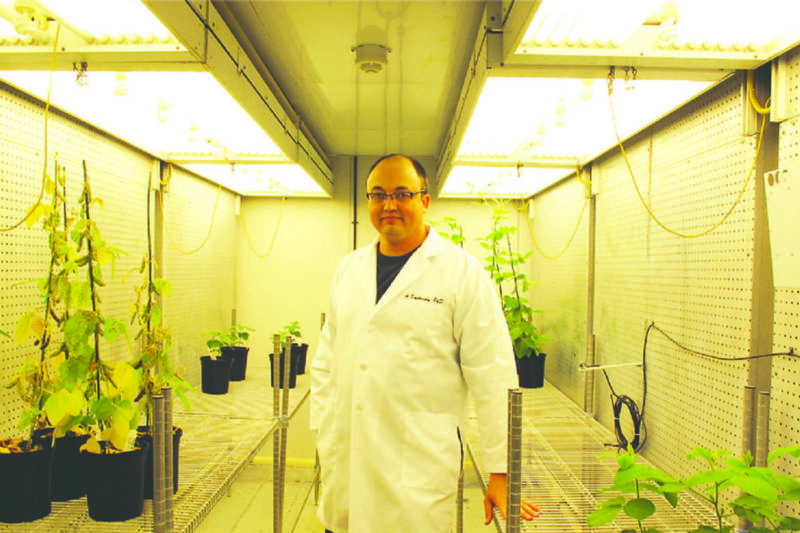Sean C. Morgan
The Sweet Home Planning Commission unanimously approved Monday evening a conditional use permit that will allow a biotechnology firm to begin raising and studying marijuana.
After receiving licensing from the Oregon Liquor Control Commission, R. Alex Krichevsky, CEO of 2GC Holdings, hopes to open the business by late August at 1491 47th Ave. The property is owned by Swan River Industries doing business as Parco Lumber Company. It is located at the north end of 47th Avenue, east of the Sweet Home Water Treatment Plant.
The business will begin with a grow operation on up to 10,000 square feet inside a 12,000 square-foot building that already exists on the property.
He showed the commission of the old mill building.
“This is how it looks today,” Krichevsky said. “We hope to improve this place and make it better.”
With federal funding unavailable for research into marijuana, the sale of flowers to wholesalers ans plants to processors will provide funding and plant material for research, Krichevsky told the Planning Commission.
His goal is to breed the plants for better medicinal property, he said.
“In the plant kingdom, the cannabis plant holds great promise for medicine and other fields of science,” Krichevsky said in his application for the permit. “However, its natural potential has not been realized due to prohibitions existing in the past few decades.”
He told the commission that he would like to have the research arm of the business running within 6 months to a year after opening.
Initially, it will provide simpler jobs, four to five, for the grow operation, he said. From there, it will employ managers and researchers and create “quality high-paying jobs.”
Krichevsky said that he and one other person will move to Sweet Home initially, but he would like to employ local residents.
He chose Sweet Home because he likes it.
“I was here in November,” said Krichevsky, who lived in New York for 10 years. “I was looking at different locations. I didn’t like Portland. It was too busy.”
He looked at Eugene and Salem also, he said. “This one looks best. I like small towns. I think you guys can benefit a little bit from growth and high-tech jobs.”
Phil Ordway, CEO of the Santiam River Development Company, wrote a letter in opposition to the permit. He and his partner, Troy Cummins, have owned 305 acres of neighboring property for more than 10 years.
The parcels closest to the proposed site of the marijuana facility are the most valuable land they own, and the 34 homes planned for it will be among the most valuable in the region, Ordway said. Ordway and Cummins are currently marketing nearby land for use by data centers and advanced light-impact manufacturing to bring significant high-paying jobs to Sweet Home.
“We are, in the strongest possible terms, categorically and emphatically opposed to this use anywhere near our property,” Ordway said. “Our reasons are simple. Our research to date indicates that this use, in spite of any claims to the contrary, will spread foul odors into the air for significant distances and may also add significant noise across our residential land due to large ventilation systems.
“Since it is to be a research facility as well as a production facility, we would assume that there will be smoke of some kind discharged from the buildings as well.
“Regardless of noise, odor and possibly smoke, we know of no circumstances where this use has added value to any adjacent residential or advanced manufacturing land in other states where marijuana production has been legalized.”
Two Sweet Home area residents also raised concerns about odor.
“To me, a marijuana bud is nauseating and disgusting,” said Linda Morrelli, who owns property on 37th Circle. It smells like a skunk, and she doesn’t want residents, including her renter, subjected to it.
She recognizes and appreciates the benefit of herbal medicine and realizes the government has not allowed the full potential benefit of marijuana to be explored, Morrelli said, but she wanted to make sure that odor is not an issue.
“I hope they succeed,” she said. “I hope they find the cure to cancer or MS.”
“It’s very valid points,” Krichevsky told the commission. “We are here not to cause a nuisance to anyone. We assure you we will put in all the filters required and ensure there are no odors (escaping) the facility.”
The facility will use carbon filtering to prevent odors from spreading and silencing mechanisms to keep down the sound from the ventilation system, Krichevsky said.
He also disputed the claim that it will keep property values from increasing. He pointed to a 2015 CNN Money story, “Denver’s housing market is on fire,” about the skyrocketing prices of homes in the Denver, Colo., area, where marijuana has been legalized. Sources in the story attributed the growth directly to the legalization of marijuana and a tightening supply of land.
He also pointed to a a 2016 story, “Will legal marijuana give home prices a new high?” at realtor.com that reported housing prices increasing in all four states where marijuana has been legalized.
Planning Commissioner Thomas Herb said he had previously invested in a pharmaceutical company in Israel, and he wished he was still invested.
“This is a cure-all literally,” Herb said. “I get goosebumps thinking about it. I think this is a plus.”
“Whether I like it or not, it seems they are meeting legal requirements,” said Planning Commissioner Henry Wolthuis.
Planner Carol Lewis told the Planning Commission that the federal government is no longer enforcing federal marijuana laws in states that have legalized marijuana.
Among criteria for conditional use permits in Sweet Home is that the use must follow local, state and federal laws.
The Planning Commission voted 6-0 to approve the permit. Present were Herb, Wolthuis, Greg Stephens, Chairman Lance Gatchell, Eva Jurney and Edie Wilcox. Anay Hausner was absent.





